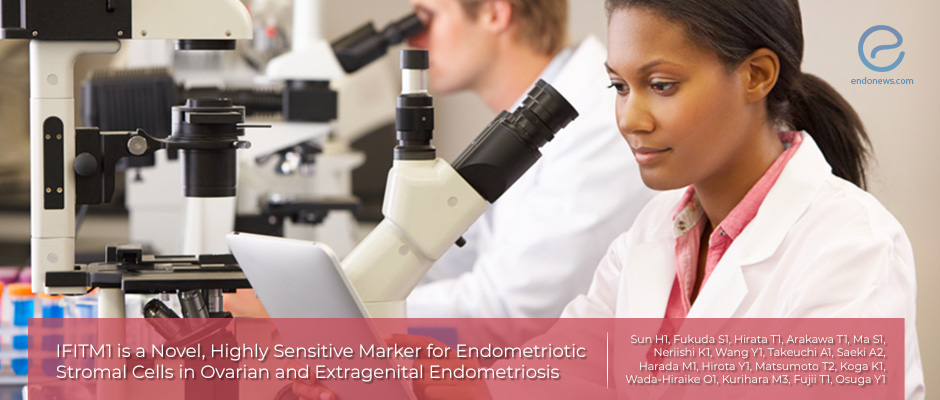A highly sensitive Immunohistochemical Marker for Stromal Cells in endometriosis
Apr 18, 2019
IFITM1 is a promising immunohistochemical marker for diagnosing endometriosis in surgical specimens
Key Points
Highlights:
- The final diagnosis of endometriosis may be problematic in daily routine surgical pathology due to several inevitable secondary changes in biopsied tissues.
- Interferon-inducible transmembrane protein 1 (IFITM1) is a recent, highly specific immunohistochemical (IHC) marker for endometrial stromal cells which may facilitate histopathologic diagnosis.
Importance:
- Currently, CD10, highlighting endometriotic stromal cells is used as a useful IHC marker for the final tissue diagnosis of endometriosis under the microscope. Since CD10 is sensitive, but not specific for endometrial stromal cells, IFITM-1 a novel new IHC marker seems superior in this context.
What's done here:
- A comprehensive analysis was made through histopathologic examination by certified pathologists comparing IFITM1 and CD10 as endometriotic stromal markers in surgically excised lesions.
Key Results:
- Both IFITM1 and CD10 were positive in all 18 samples of ovarian endometrioma.
- All 44 extragenital endometrioses were immunoreactive for IFITM1, whereas 42 (95.5%) samples were positive for CD10.
- There were no differences between hormonally treated and untreated patients in both markers with 100% positivity.
Lay Summary
Endometriosis is diagnosed histopathologically by the presence of endometrium-like tissues outside the uterus. Positive CD10 immunohistochemistry, highlighting stromal cells of the endometrium, is a useful adjunct for pathologists in the tissue diagnosis.
However, CD10 expression is not specific to endometrial stromal cells and is found in other cells such as hematopoietic, renal tubular and smooth muscle cells. Previous studies of endometrial stroma and endometrial stromal neoplasms showed that IFITM1 is more specific to the endometrial stromal cells than CD10.
In this study conducted by a group of Japanese researchers and published recently in "SAGE Journals Reproductive Sciences", a total of 62 patients were enrolled after surgical excision of endometriotic tissues. Paraffin-embedded specimens were examined by routine hematoxylin and eosin stain and immunohistochemically using IFITM1, CD10, estrogen receptor (ER), progesterone receptor (PR), and paired-box gene 8 (PAX8) antibodies. In all 62 endometriosis patients (18 ovarian, 44 extragenital), all (100.0%) were positive for IFITM1 and 60 (96.8%) for CD10, with 2 cases in which CD10 was negative ultimately determined as positive for IFITM1, ER, PR, and PAX8. In addition, IFITM1 sensitivity was unaffected by the presence or absence of hormonal therapy.
To the best of the authors' knowledge, this study represents the first demonstration of IFITM1 as a highly sensitive stromal marker of ovarian and extragenital endometriosis.
"We demonstrated that IFITM1 is a highly sensitive stromal marker of endometriosis and extragenital endometriosis. Given our findings showing IFITM1 sensitivity as comparable or possibly superior to that of CD10, IFITM1 can be a useful addition in the immunohistochemical examination of the disease, particularly in the accurate diagnosis of endometriosis in cases of ambiguous or unexpected CD10 expression" added the research team.
The efficacy of IFITM1 in this context should be validated by further examination and in clinical practice.
Research Source: https://www.ncbi.nlm.nih.gov/pubmed/30791812
endometriosis pathology CD10 endometrial stroma specificity sensitivity ER PgR PAX8 endometrioma pathologist IFITM1 marker

